- Home
- Roger Zelazny
The Mask of Loki Page 15
The Mask of Loki Read online
Page 15
There was no one he could tell about the miracle. Tom had never considered inviting Sandy to join him in the pool, nor had she ever asked. And Tiffany and Belinda cared nothing for his music as they dodged and wove through the nightly free-for-all.
The pool contained other unexplained incidents.
On Gurden's second night there, he found an orange stain at the bottom of his drink, melted inside the glass. Was it the same tumbler that Sandy had given him in the apartment? He could never be sure. It certainly might have been, plain as it was. And the wisp of discoloration was the right shape and hue.
Had Tiffany or Belinda brought him the soda that night? Tiffany, he thought... But she and Sandy were definitely strangers.
Could someone have slipped the glass into the piano's bar rack, hoping it would find its way to Gurden's hand? Unlikely, with a hundred such glasses in circulation—not counting losers collecting at the deep end by the drain—during any night. Except that, as a piano player, Tom was the first or second person to get a drink from the bar. And he tended to nurse his one glass all night or get refills right from the source.
Gurden slipped a hand free of the playing straps and picked up the glass. The familiar shock or tingle that had gone through him the first time was still there. The sensation was dulled by the water, by the jostling movement around him, by some familiarity. But still the tingle could reach to his toes.
He took a sip of stale soda and ice-melt and put the glass back by the music holder. His hand found the strap again and picked up the rhythm.
It was nice to be loved.
Or at least looked after.
* * *
Eliza: Good morning. This is Eliza—
Garden: Hello, doll. Two-one-two, please. Tom Gurden calling.
Eliza: Hello, Tom. Where are you?
Gurden: Still in Atlantic City.
Eliza: I judge from your voice that you are more relaxed than you have been for several days.
Gurden: That may be. I don't know.
Eliza: Does the work you're doing agree with you?
Gurden: You can get used to anything, I guess.
Eliza: Do you still have dreams?
Gurden: Yes.
Eliza: Tell me about your dreams, Tom.
Gurden: The latest one was a bad one. Not just eerie, but actually frightening. A nightmare.
Eliza: Describe it, please.
Gurden: It's just a dream. I thought you cyberpsychs didn't hold with Freudian analysis. So why are—
Eliza: You said yourself, Tom, that people were trying to get into your mind. These are more than dreams, especially as they come in a waking state.
Gurden: But they recur at night, too.
Eliza: Of course, the residue of experience. Have you ever experienced deja vu?
Gurden: Sure. Everyone has.
Eliza: That particular sense of familiarity is actually a chemical miscue in the brain. The mind is momentarily interpreting a new experience as if it had come from a stored memory. With a trillion synapses firing in waves across the cerebrum, it's to be expected that a certain percentage of the signals will get mixed.
Gurden: What does this have to do with my dreams?
Eliza: Dreams, deja vu, hallucinations, things seen out of the corner of your eye—all are patterns and veils that the inattentive mind draws across the randomness of experience. What you have once seen, you may later remember and think about, then eventually dream it.
Gurden: But these dreams are not real! They are jamais vu, never seen.
Eliza: Reality, as my first programmer would have said, is a coat of many colors. A thousand synapses discharging in near-random patterns—that is reality.
Gurden:... Near-random?
Eliza: Tell me about your dream, Tom. This latest dream.
Gurden: All right... I think it started with another gig I was doing. I was playing for a soldier's reunion, a company of Air Cavalry pilots who had seen action in San Luis Potosi and the Rio Grande Free State during the war. I was free-styling one of their marching songs—half in English, half Spanish—about the second taking of the Alamo. Suddenly, between one bar and the next, I saw a flash of something, like metal, behind my eyes. It was the flash of a sword, cutting the air.
* * *
"Artifacts, Lieutenant," Madeline Vichaud spoke from behind the ledgers on her counting desk. "I sell only genuine artifacts of proven lineage."
Mme. Vichaud would be a looker in anyone's book, Marine Lieutenant Roger Courtenay decided, if she would only dress the part. Put away the ruffled white shirtwaist and dusty-dark taffeta skirt of the Teens and Twenties, from an era when French colonials were still dressing like Parisiennes of the Nineties. Get herself some modern clothing—perhaps something Asiatic, like those tight, brightly colored silk dresses, slit up to the hip, that the Saigonese bargirls were always wearing. Something that moved when she moved. With a shapely woman of Mme. Vichaud's blonde, almost Nordic coloring, the combination would certainly...
"That sword is true Napoleonic era, Lieutenant. It is an officer's model, patterned after the Roman gladius, or short stabbing sword."
Courtenay took a few experimental swings with the plain, almost unhilted, sword. He tried to pivot the swing around the balance point, as he had learned in fencing class. The locus felt wrong, though: too far inside. The broad, flat, straight-sided blade, about as sharp as a new hunting knife, wobbled in his hand and fell off to the left. It seemed to want a piece of his kneecap and almost got one.
"Something wrong there."
"The gladius was designed for a man of smaller stature," she said in her dry, schoolmarmish voice. He had not thought she would glance up at his cuts and thrusts. "Someone from this century, when men are larger in almost every dimension, would find it unwieldy."
"Anyway, I'm looking for something a little more—"
"Try the Heidelberg, fourth from the left on the back table. It is a duelist's blade, a saber of more modern design."
"Modern? Well..."
Courtenay picked up the long whip of steel, about as wide in cross-section as his little finger. The hilt was protected by a shallow basket of steel slats. Something about the grip—
"Hey! Are these diamonds?"
"Rock crystal, Lieutenant. That is a gentleman's sword, with modest decoration."
He wrapped his fingers about the studded panels and lifted it, long and limber. He backed into the aisle between the shop's display tables and went en garde. The steel had just enough springiness to hold its line when held level, if he held the spline of the blade vertical. When he waggled it left or right, the tip sagged. The balance, however, was perfect for his arm.
Courtenay brought the balance up in a salute and—agh! A sharp facet on one of the pieces of rock crystal stabbed into his palm, scoring the ball of his thumb.
"What is that?" Mme. Vichaud asked.
"I cut myself," he said sheepishly, licking at the wound. It stung more than a normal scratch, even accounting for the light film of sweat on his hands. Courtenay thought passingly about the strange fungi and bacteria that would undoubtedly grow in a jungle country like Vietnam.
"You Americans are so like little boys, sometimes. If you have cut yourself with a sword, Lieutenant, it is no responsibility of mine."
But Courtenay barely heard her. He was staring at the crystals in the decorated handle, seeking some kind of dirt or mold that would explain the stinging in his hand. There! One of the shards was brownish, as with old blood. Evidently that ragged bit of glass had taken another victim years ago in precisely the same way.
Courtenay took a final lick at his palm and put the sword down, lefthanded, in its place on the table.
"Are you buying, Lieutenant?"
"I guess... Well, how much for the Roman sword?"
"Forty thousand dong."
"That's—ah—four hundred bucks! An awful lot to pay, just for something to decorate my hootch."
> "I sell only genuine artifacts, Lieutenant."
"Well, I guess not today, ma'am."
"As you wish. Please close the door gently on your way out."
"Yes, ma'am. Thank you."
* * *
The heavy thwock-thwock of fiberglass rotors beat the air around the Huey and drummed into the talker's helmet that Courtenay wore. Looking back along their route, he could see the top of the jungle canopy bend and right itself behind the last slick in line.
The three squads of his platoon were deployed in choppers when they might as easily have ridden the thirty kilometers to Cu Chi by truck. Trucks, however, were vulnerable to ambush, even in the streets of Saigon, by peasant boys on bicycles with satchel charges disguised as bags of rice or cases of beer. Helicopters could be ambushed only at the base as they took off or at the landing zone while his men disembarked.
Dead was dead, either way.
Courtenay rehearsed the landing in his mind. The four Hueys would come into the dry paddy two by two, with their door gunners blazing away. He hoped the rotor wash would kick up so much dust that anyone waiting beyond the dikes might lose a clear shot. A little dust down the collar was better than a round through the head.
They landed and scooted in waves toward the cover of the trees. Normally that was bad practice, because the NVA machine gunners liked to set up in the cover of trees. But not this time. Courtenay knew from his orders that his colonel had a command post established in those trees—or had one as of 0600 that morning.
When a white hand showed among the undergrowth and pointed them to the left, he knew that the Americans still held the treeline.
He left his men in a shallow clearing and went on to the CP behind a major whose cammies were pressed with knife-edge creases and whose boots were spitshined under a layer of red dust.
The CP was an eight-man tent erected on the hard dirt. Its ropes were tied to tree boles and large rocks instead of pegs driven into the ground. Before it, Colonel Roberts had a sector topo map spread on a trestle table. He looked up as Courtenay and the major approached.
"Major Benson, go back and instruct the lieutenant's men about noise discipline."
"Yes, sir." The major nodded and turned to leave the way they had come.
Courtenay saluted the colonel and stood at attention. His cammies were streaked with sweat and dust. The green nylon uppers of his jungle boots had not seen a brushing in four days, let alone a spitshine.
"At ease, Lieutenant. We're not on base now."
"Yes, sir. I mean, no, sir."
"How many NVA would you say are in this sector?"
"In Cu Chi District itself, sir? Or just this sector?"
"Within three hundred meters of this position."
"Well, sir, from the way our men are spread out here, and they're not exactly engaged in a firefight at this minute, I'd say zero to none."
"Would you, Lieutenant? And what if I told you we had intelligence reports of an NVA battalion HQ and five companies of regular army troops within three hundred meters of this spot as of 1800 hours yesterday?"
Courtenay looked around at the unscarred tree-trunks, the lush underbrush, the dirt marked only by American boots, size seven and above.
"I'd say, Colonel, that they've di-died pretty thoroughly."
"They haven't gone anywhere, Lieutenant. At least, not that we can tell."
"Begging your pardon, sir—would the Colonel please come in out of the sun?"
"Not funny, Lieutenant. Given that all I've told you is God's honest truth, what do you make of it?"
"If someone hasn't been lying to you, sir, then I would say Charlie and his Big Brother have either learned how to fly—or how to dig like a mole."
"Very good, son. Take a closer look at this map. Those X's mark certain anomalies that my men have noted in the surrounding bush."
"Anomalies, sir?"
"Mole holes."
"Yes, sir. If the Lieutenant may ask, why is the Colonel telling him this?"
"Because I have selected your platoon for the honor of being first to go down the holes and... tell me what you find."
"Yes, sir. Thank you, sir."
* * *
Courtenay looked down at a smooth circle in the ground, which had been cleverly concealed beneath a trapdoor of heavy planks.
The door was stout enough to stand up to casual bombardment with mortars and grenades, everything except a direct hit with an artillery shell. The hinges were four strips from the tread of an old truck tire; they were nailed to one side of the square panel and splayed out like the fingers of a hand. The strips had been buried in the red soil with bamboo stakes through their ends for an anchor. The top of the door was camouflaged with brush—not cuttings, which would dry out, turn brown, and give the entrance away, but whole plants trained to grow in a thin layer of soil potted on the door's upper side. Only an occasional watering would be needed to keep the door secret.
The hole beneath it was a meter in diameter. The shaft below slid away at an angle of forty-five degrees; so the shaft had a definite floor and ceiling. They and the walls were as smooth as concrete, rubbed and patted down by hands and knees, flanks and backs.
Courtenay shone a flashlight down the shaft.
Nothing.
He got down on his belly, levered his chest over the opening, and spread his arms and shoulders to block out the dappled sunlight coming through the treetops. When his eyes adjusted to the gloom, he switched the flashlight on again, covering the lens with three fingers to control the glare.
Still nothing.
He clicked off the light, wiggled back onto solid ground, rolled over and sat up.
"Do you want to declare it bottomless, Lieutenant?" Sergeant Gibbons asked.
"Maybe it comes up back home in Sioux City," Pfc Williams offered.
"If it does," Courtenay replied, "then we're gonna roll a grenade right up on your momma's porch."
He put out his hand and Gibbons put a fragmentation grenade into it.
"You know, sir," the sergeant offered casually, "after you drop that, whoever's down there is going to know we're up here. And when we have to go down after them, they may just be mad about it."
"The thought has crossed my mind. But I just want to warn them to keep their heads down."
Courtenay pulled the pin and pitched the grenade down the angled shaft like a fast ball so it would go far before striking dirt, slowing down, and rolling. They all pulled away from the opening and its prospective blast cone.
Whump!
The earth below them hardly moved. A rolling plume of red dust came out of the hole ten seconds later.
"Nobody home?" Pfc Jacobs asked.
"Looks like somebody has to go down after all," Courtenay said, pushing on his knees and rising out of his squat to stand just south of the hole. "Who's the shortest man here?"
He looked up at a decided angle to the soldiers around him.
"All right," he sighed. "I guess I am."
"We're right behind you, Lieutenant."
"Every step of the way, sir."
"Sure," he said with a bravado grin. "Don't push in your eagerness to get down there first."
Courtenay had no experience of tunnels; no American in Vietnam did at the time. But he was not plagued by claustrophobia, as others might be. And he was sure of his hand-to-hand skills: some judo; a dexterity with the pugil sticks that he had enjoyed during basic; his fencing, of course; and its poor cousin, knife fighting, which he learned on the streets of Philadelphia. This looked to be a silent mano a mano in the dark, enclosed spaces instead of any kind of open firefight.
Courtenay chose his setup with care: Spare bootlaces tied his cammie trouser cuffs closed against rats and spiders, although he figured if there was an entire NVA battalion down there, the rats had been eaten long ago. For a weapon, he took his officer's sidearm but stuck it in the back of his web belt, along his spine, instead of flopping a
round in its holster. In his left hand he took a fresh flashlight with a full charge on its batteries. He would use it only for surprise; most of the passage he intended to feel his way, as Charlie would undoubtedly be doing. In his right he held a K-bar, the Marines' long knife with a dull-black finish and rough handle of stacked leather disks pierced by the tang. No matter how slippery with sweat his hands became, he would be able to grip that knife. He held it diagonally across his palm as a fencer would a foil or epee; that felt most natural and gave him good control either forehand or backhand. Finally, he tied a yoke of rope around his shoulders and passed it under his belt in the back so it would not foul his automatic.
"One tug means feed out more. Two tugs mean pull me back," he told Gibbons. "That's about all we're going to need to say, right?"
"Yes, sir."
"What have you got there? Twenty-five meters?"
"Yes, sir."
"We shouldn't need any more than that. If you have to tie on another coil, give me two tugs so I'll stop before I take the bare end down after me. All right?"
"Yes, sir." Gibbons and all the men had gone strangely quiet. No jokes. No slacking off.
Courtenay looked around at the clearing with its patches of green that were spangled golden by spots of sunlight. He took deep breaths, as if he were about to dive into water, then got down on his knees before the meter-wide hole and began crawling forward.
"Sir! Wait!"
Courtenay paused on the lip of the hole, turned to see a short, stocky man running up. He wore regulation cammies with a private's black stripes; the nametag over his right breast said, "Bouchon." Yet this new man wore his uniform self-consciously, like it was some costume instead of the clothing he'd lived with for months. In fact, the edges of its dyed camouflage markings on his blouse and trousers were still crisp and bright, as if fresh out of the box and never washed. He carried his M-60 machine gun and the crossed bandoleers of cartridges lightly, like lightweight plastic toys, despite the thick jungle heat.

 Seven Tales in Amber
Seven Tales in Amber Frost and Fire
Frost and Fire Doorways in the Sand
Doorways in the Sand Unicorn Variation
Unicorn Variation A Night in the Lonesome October
A Night in the Lonesome October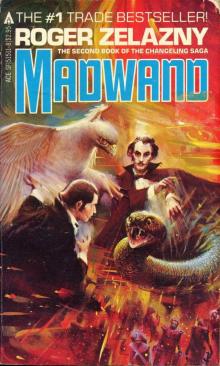 Madwand
Madwand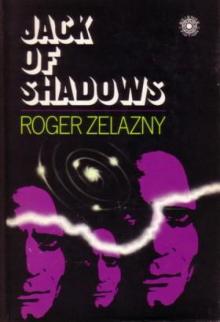 Jack Of Shadows
Jack Of Shadows Lord of Light
Lord of Light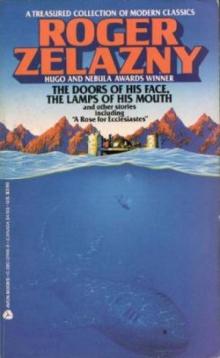 The Doors of His Face, The Lamps of His Mouth and Other Stories
The Doors of His Face, The Lamps of His Mouth and Other Stories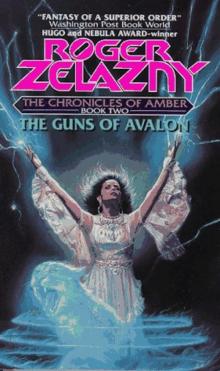 Guns Of Avalon tcoa-2
Guns Of Avalon tcoa-2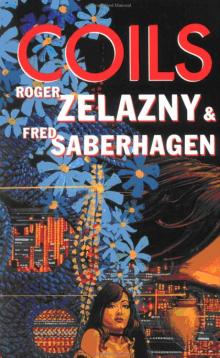 Coils
Coils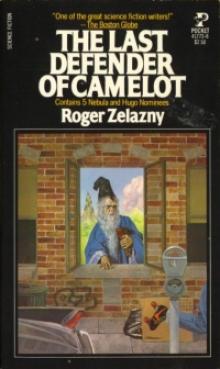 The Last Defender Of Camelot
The Last Defender Of Camelot Creatures of Light and Darkness
Creatures of Light and Darkness This Immortal
This Immortal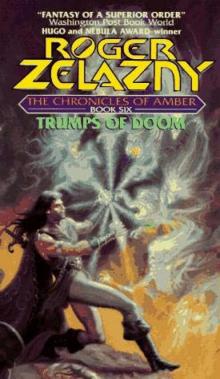 Trumps of doom tcoa-6
Trumps of doom tcoa-6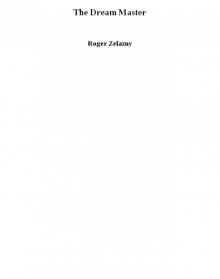 The Dream Master
The Dream Master The Complete Dilvish, The Damned
The Complete Dilvish, The Damned Nine Princes in Amber
Nine Princes in Amber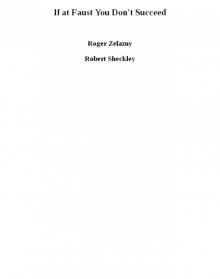 If at Faust You Don't Succeed
If at Faust You Don't Succeed Here there be dragons
Here there be dragons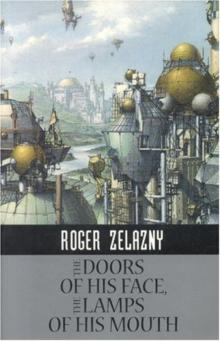 The Doors Of His Face, The Lamps Of His Mouth
The Doors Of His Face, The Lamps Of His Mouth The Great Book of Amber - Chronicles 1-10
The Great Book of Amber - Chronicles 1-10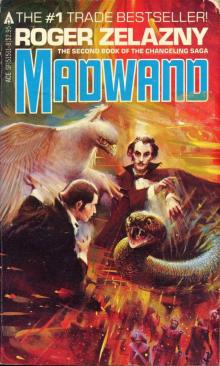 Madwand (Illustrated)
Madwand (Illustrated) The Chronicles of Amber
The Chronicles of Amber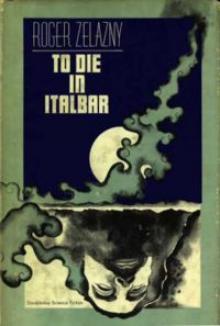 To Die In Italbar
To Die In Italbar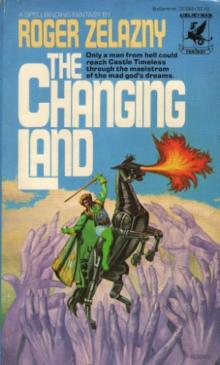 The Changing Land
The Changing Land The Furies
The Furies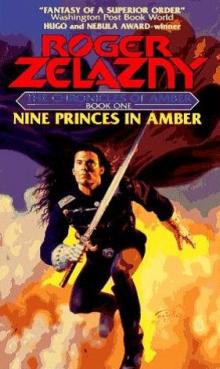 Nine Princes In Amber tcoa-1
Nine Princes In Amber tcoa-1 Last Of The Wild Ones
Last Of The Wild Ones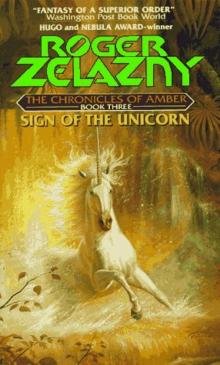 Sign of the Unicorn tcoa-3
Sign of the Unicorn tcoa-3 My Name is Legion
My Name is Legion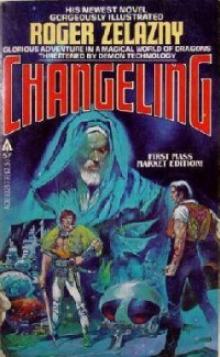 Wizard World 1: Changeling
Wizard World 1: Changeling Changeling
Changeling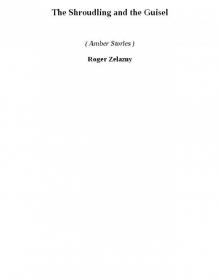 The Shroudling and the Guisel (amber stories)
The Shroudling and the Guisel (amber stories)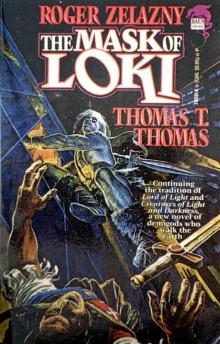 The Mask of Loki
The Mask of Loki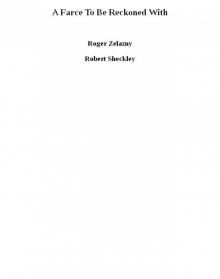 A Farce To Be Reckoned With
A Farce To Be Reckoned With Roadmarks
Roadmarks When Pussywillows Last in the Catyard Bloomed (rtf)
When Pussywillows Last in the Catyard Bloomed (rtf)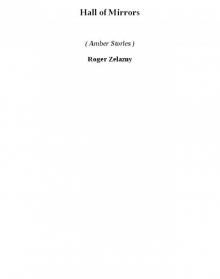 Hall of Mirrors (amber stories)
Hall of Mirrors (amber stories) Permafrost
Permafrost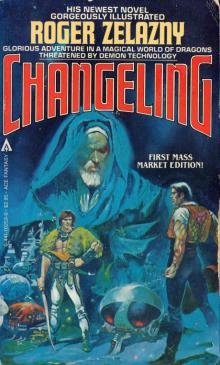 Changeling (Illustrated)
Changeling (Illustrated)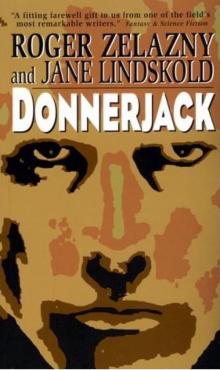 Donnerjack
Donnerjack Shadows & Reflections: A Roger Zelazny Tribute Anthology
Shadows & Reflections: A Roger Zelazny Tribute Anthology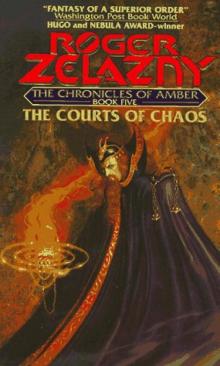 The Courts Of Chaos tcoa-5
The Courts Of Chaos tcoa-5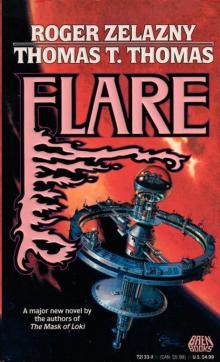 Flare
Flare Doorsways in the Sand
Doorsways in the Sand The Great Book of Amber
The Great Book of Amber Home Is the Hangman
Home Is the Hangman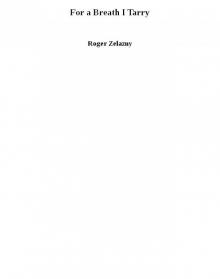 For a Breath I Tarry
For a Breath I Tarry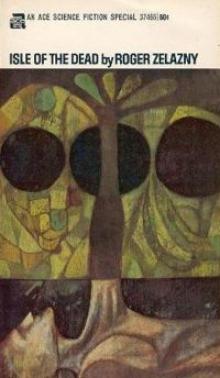 Isle Of The Dead
Isle Of The Dead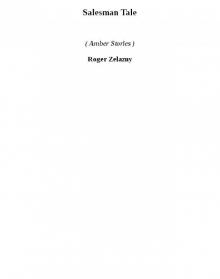 Salesman Tale (amber stories)
Salesman Tale (amber stories) Dismal Light
Dismal Light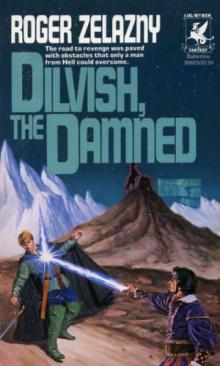 Dilvish, The Damned
Dilvish, The Damned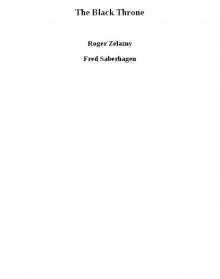 The Black Throne
The Black Throne Wizard World 2: Madwand
Wizard World 2: Madwand The Salesman's Tale
The Salesman's Tale